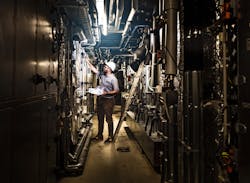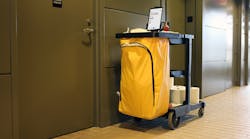Worldwide travel has largely resumed. The international airports have prepared for this with hygiene concepts to prevent further spread of the corona virus. Ventilation systems are highly important in this context, as they are an essential requirement for the operation of airport terminals.
If the ventilation inside a building is insufficient, pollutants, viruses and allergens cannot be transported outside. Correctly planned and properly operated systems are useful instruments in this case. Among other things, they ensure a sufficient exchange of used air with fresh air as well as efficient filtering. In turn, they provide high air quality and thus a healthy indoor climate in the building.
Especially during the current corona pandemic, operators of indoor ventilation systems are increasingly confronted with questions regarding the handling of their systems. To ensure that healthy and hygienically perfect operations are guaranteed, specialists such as expert for healthy indoor environment Wolf recommend, in addition to proper operation of the system, adherence to the maintenance and inspection intervals in accordance with the generally recognized rules of technology.
Fresh air protects health and contributes to the continuation of operations
Many diseases spread especially quickly within closed rooms. For example, in addition to the droplet infection, people infected with the coronavirus release countless viruses into the environment when coughing or sneezing, where they are spread far into the air via aerosols. Experts agree that good ventilation in rooms helps to reduce the infection risk. It is therefore important to keep the amount of droplets as low as possible, especially in busy airport terminals, and to continuously replace as much used indoor air as possible with outdoor air. Only a properly operated and regularly maintained HVAC (Heating, Ventilation and Air Conditioning) system can do this effectively.
Advice for the operation of HVAC systems
It is generally recommended that rooms continue to be well ventilated even in the current situation. The relative room air humidity should be in a range between approx. 30 percent and 65 percent. Too little humidity attacks the sensitive mucous membranes of the upper airways, which are more susceptible to viruses. For the operation of air conditioning and ventilation systems during the Corona pandemic, the Federation of European Heating, Ventilation and Air Conditioning Associations (REHVA) has issued the following recommendations for the operation of air conditioning systems in a joint statement:
- Do not switch off HVAC systems with fresh air, do not reduce the fresh air volume flows.
- Reduce the recirculation air components - if present in the systems - in favour of the fresh air components. If possible, operate the systems with 100 percent fresh outside air.
- The humidity in occupied rooms should be in a range between 30 percent and 65 percent relative humidity.
- If necessary, extend the operating times of the systems before and after the regular time of use.
- Secondary ventilation units (fan coil units, induction units) are only effective in an individual room and do not transfer the air to other rooms.
- Any maintenance due should be addressed now and the maintenance intervals should be shortened, especially in regard to filter changes and





